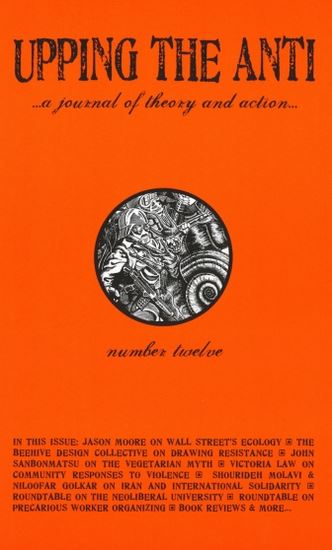
In my contribution to the book, The Good It Promises, the Harm It Does (ed. Carol J. Adams, Alice Crary, and Lori Gruen, Oxford University Press, 2023.), I offer a critical account of the Effective Altruism movement, arguing that it best understood as a symptom of reification, the process under advanced capitalism by which thought and culture come to resemble the commodity form. (CLICK ON CHAPTER IMAGE, ABOVE, TO DOWNLOAD PDF.)
|

"Murder, She Wrote: Legitimating the Meat Economy with 'Femivorism'" (2023). In Hope Bohanec's anthology exploding the myth of "humane" and "compassionate" exploitation of animals in agriculture, I analyze the femivore bildungsroman--the new genre in women's nonfiction in which women take up animal farming, ranching, and hunting as a way to achieve "empowerment" as women. More than a cultural curiosity, the femivore phenomenon has become central to society's efforts to legitimate the failing meat economy. By depicting violence against animals as a form of women's empowerment and maternal care, femivorism is providing society with a new set of rationales for maintaining its endless cruelties towards other beings.

"It has become common to view mass historical traumas like the atomic bombings of Hiroshima and Nagasaki or the Holocaust as singularities--in other words, events of such...almost metaphysical significance that they exceed intelligibility. Drawing on Kant's analytic of the sublime, in which the subject, in confronting an awesome or terrifying phenomenon from a position of safety, comes to realize his or her own powers of transcendence and moral superiority, I argue that the holocaust sublime encourages the viewing subject to 'face' overwhelming horrors of the past without having to confront the subject's actual responsibility for the atrocities of the present. By pitting the extraordinary or 'singular' against the banal and everyday, the holocaust sublime thus obscures, rather than reveals, the habits of thought and social structures that make genocidal practices inevitable." Published in the American Journal of Economics and Sociology, Vol. 68, No.1 (January, 2009). (CLICK ON CHAPTER IMAGE, ABOVE, TO DOWNLOAD PDF.)

Video games are among the most powerful forms of media today. They are also among the most culturally injurious, socializing hundreds of millions of people into forms of aggression, war, and toxic masculinity.
Originally published in WPI Magazine, Fall 2013.
Originally published in WPI Magazine, Fall 2013.

"Why Capitalism Shouldn't Be Saved," in Tikkun Magazine (Volume 24, Number 3, May/June 2009).
"Capitalism is rightly credited with having unleashed enormous forces of productivity and technology. But it has also reduced much of the world to ruin and squalor. After four centuries of triumph as the dominant mode of global development, capitalism has furnished for itself a world in which one out of two human beings lives on $2 per day or less, and more than one in three still lacks access to a toilet. Most children in the world never complete their education, and most will live out their lives without dependable medical care. As the world economic crisis deepens, already deplorable conditions in the Third World will only deteriorate further. Meanwhile, our planet is dying...."
"Capitalism is rightly credited with having unleashed enormous forces of productivity and technology. But it has also reduced much of the world to ruin and squalor. After four centuries of triumph as the dominant mode of global development, capitalism has furnished for itself a world in which one out of two human beings lives on $2 per day or less, and more than one in three still lacks access to a toilet. Most children in the world never complete their education, and most will live out their lives without dependable medical care. As the world economic crisis deepens, already deplorable conditions in the Third World will only deteriorate further. Meanwhile, our planet is dying...."

BOOK REVIEW: "Solidarity Between Beings: Review of Marco Maurizi's Beyond Nature: Animal Liberation, Marxism, and Critical Theory," Society and Animals (2024).
Click on Image at left for PDF.
EXCERPT: "Maurizi, a socialist as well as an animal rights activist, begins Beyond Nature on a personal note, lamenting the mutual suspicion with which Marxists and animal advocates have often viewed one another. Marx and Engels dismissed the animal welfare movements of their time as expressions of cheap bourgeois sentimentalism, and their dismissive view is still widely shared by socialists and leftists today. Many contemporary vegans, meanwhile, have embraced the free market as a solution to the problems of the animal economy, hoping that consumers can be weaned off animal products through new plant-based and cellular meat alternatives – with the help of “enlightened” venture capitalists. Notwithstanding these tensions between the two traditions, Maurizi sets out to reconcile them, arguing that neither animal liberation nor socialist praxis can succeed without the other."
Click on Image at left for PDF.
EXCERPT: "Maurizi, a socialist as well as an animal rights activist, begins Beyond Nature on a personal note, lamenting the mutual suspicion with which Marxists and animal advocates have often viewed one another. Marx and Engels dismissed the animal welfare movements of their time as expressions of cheap bourgeois sentimentalism, and their dismissive view is still widely shared by socialists and leftists today. Many contemporary vegans, meanwhile, have embraced the free market as a solution to the problems of the animal economy, hoping that consumers can be weaned off animal products through new plant-based and cellular meat alternatives – with the help of “enlightened” venture capitalists. Notwithstanding these tensions between the two traditions, Maurizi sets out to reconcile them, arguing that neither animal liberation nor socialist praxis can succeed without the other."

"Blood and Soil: Notes on Lierre Keith, Locavores, and Death Fetishism," in Upping the Anti (AK Press), Issue 12, Aug. 16, 2017. In this essay, I review and deconstruct Lierre Keith's book The Vegetarian Myth, a defense of raising and killing animals for food. (I later revised and expanded on this article for Z Magazine--available here.) Derrick Jensen criticized me in a later issue of the journal. I then responded to Jensen here.




